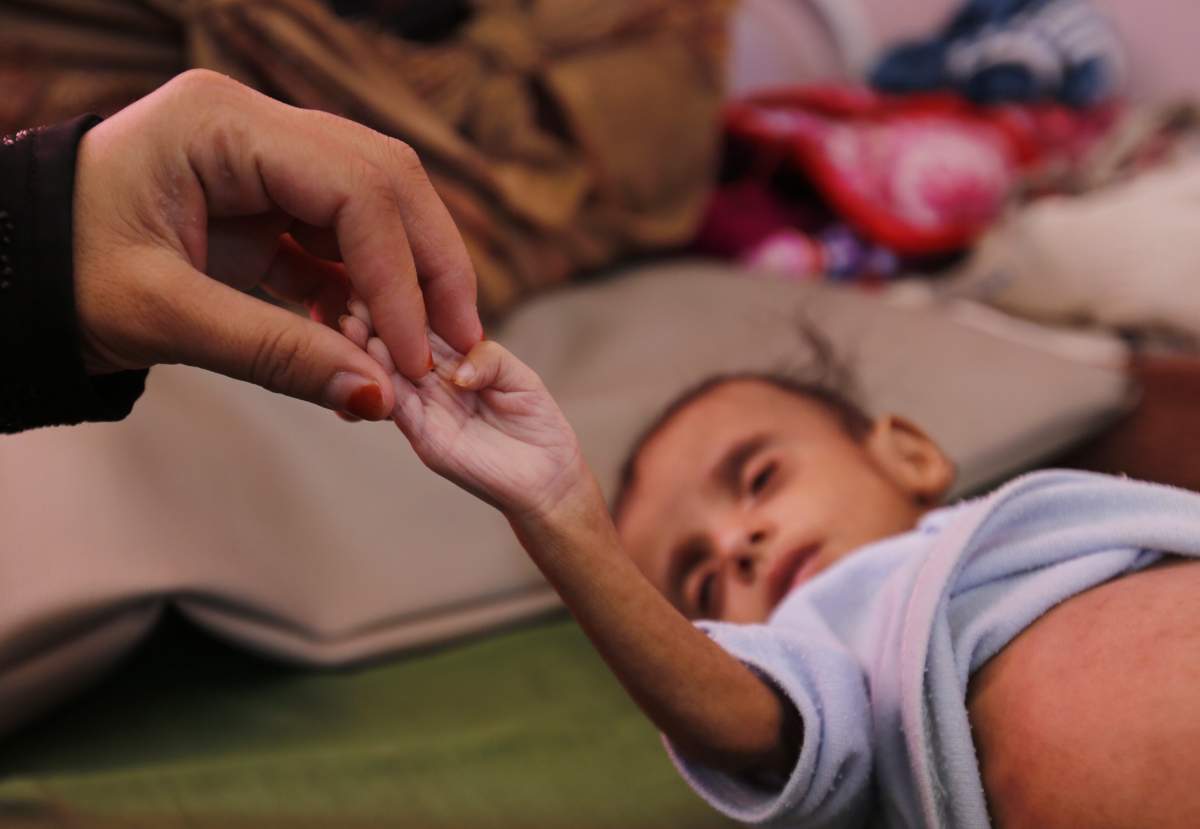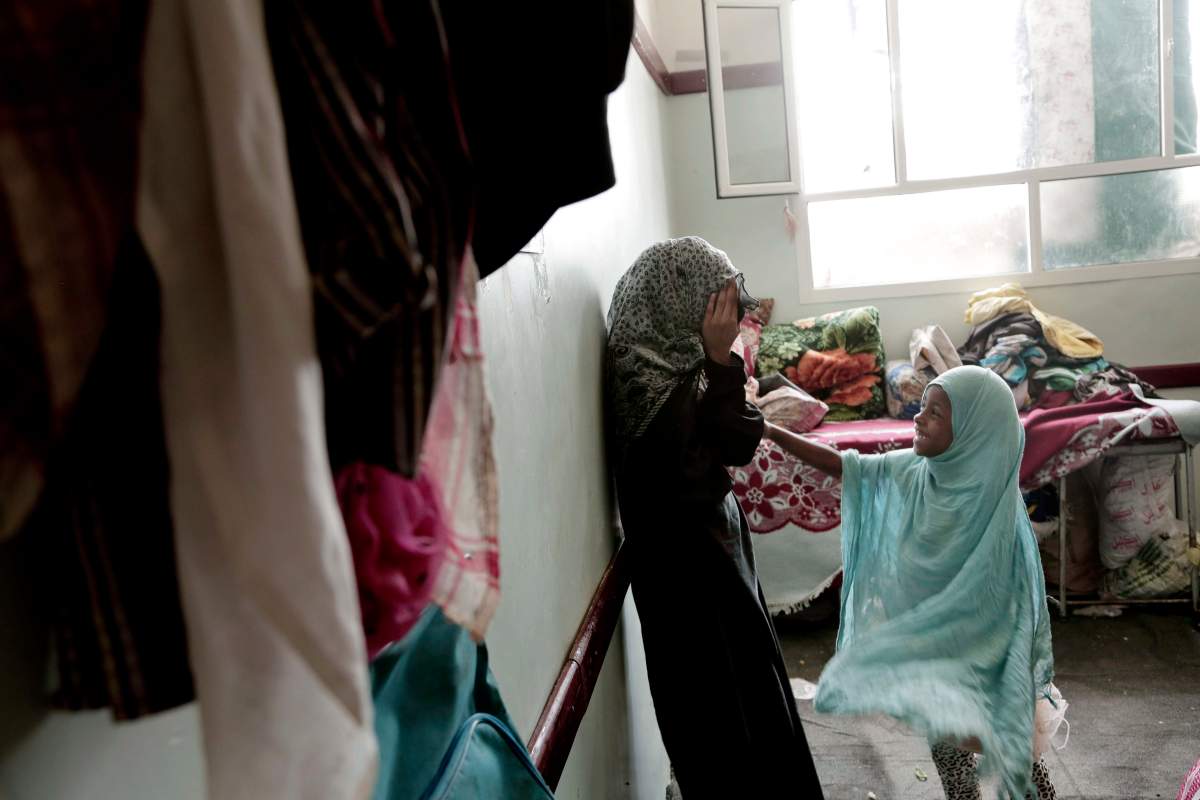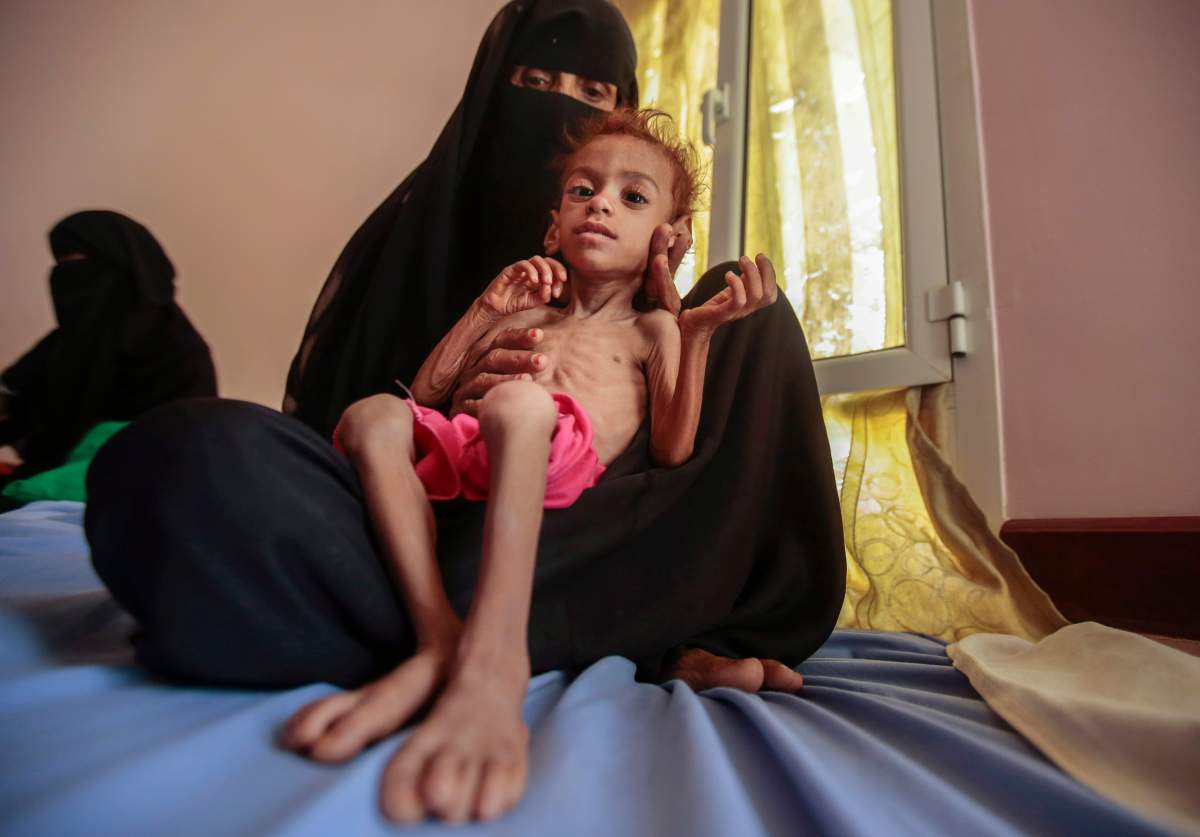Day after day Nabil al-Hakimi, a humanitarian official in Taiz, one of Yemen’s largest cities, went to work feeling he had a “mountain” on his shoulders. Billions of dollars in food and other foreign aid was coming into his war-ravaged homeland, but millions of Yemenis were still living a step away from famine.

Reports of organizational disarray and out-and-out thievery streamed in to him this spring and summer from around Taiz — 5,000 sacks of rice doled out without record of where they’d gone . . . 705 food baskets looted from a welfare agency’s warehouses . . . 110 sacks of grain pillaged from trucks trying to make their way through the craggy northern highlands overlooking the city.
WATCH: Senate votes for resolution ending U.S. support of Yemen war

Food donations, it was clear, were being snatched from the starving.
Documents reviewed by The Associated Press and interviews with al-Hakimi and other officials and aid workers show that thousands of families in Taiz are not getting international food aid intended for them — often because it has been seized by armed units that are allied with the Saudi-led, American-backed military coalition fighting in Yemen.

Get breaking National news
“The army that should protect the aid is looting the aid,” al-Hakimi told the AP.
Across Yemen, factions and militias on all sides of the conflict have blocked food aid from going to groups suspected of disloyalty, diverted it to front-line combat units or sold it for profit on the black market, according to public records and confidential documents obtained by the AP and interviews with more than 70 aid workers, government officials and average citizens from six different provinces.
“These incidents of fraud amount to stealing food from the mouths of hungry Yemeni children,” Beasley wrote.The WFP said its own investigation had found “evidence of trucks illicitly removing food from designated food distribution centers” in Houthi-controlled areas as well as fraud by a local food aid distributor connected to the Houthis’ Education Ministry. It said it learned many people in the Houthi-controlled capital, Sanaa, have not been getting food rations they’re entitled to and that in other areas “hungry people have been denied full rations.”The World Food Program has 5,000 distribution sites across the country targeting 10 million people a month with food baskets but says it can monitor just 20 percent of the deliveries.This year the U.N., the United States, Saudi Arabia and others have poured more than $4 billion in food, shelter, medical and other aid into Yemen. That figure has been growing and is expected to keep climbing in 2019.Despite the surge in help, hunger — and, in some pockets of the country, famine-level starvation — have continued to grow.
“This has nothing to do with nature,” Cappelaere told the AP. “There is no drought here in Yemen. All of this is man-made. All of this has to do with poor political leadership which doesn’t put the people’s interest at the core of their actions.”David Beasley, executive director of the U.N.’s food program, said “certain elements of the Houthis” are denying the agency access to some parts of rebel territory — and appear to be diverting food aid.“It’s a disgrace, criminal, it’s wrong, and it needs to end,” Beasley said in an interview Sunday with the AP. “Innocent people are suffering.”The rebels and the coalition forces have begun peace talks in recent weeks, a process that has led to a reduction in fighting and eased the challenges of getting food aid into and out of Hodeida, the port city that is a gateway to the Houthi-controlled north. But even if donors are able to get more food in, the problem of what happens to food aid once it makes landfall remains.WATCH: ‘Hopeful start’ to Yemen peace talks

‘THE POOR GET NOTHING’
The war in Yemen began in March 2015 after Houthi rebels swept out of the mountains and occupied northern Yemen, forcing the government of Yemeni President Abed Rabbo Mansour Hadi into exile.After the rebels began pushing farther south, Saudi Arabia and other Persian Gulf states formed a coalition to take on the Houthis, describing their involvement as an effort to stop Iran, which has ties to the Houthis, from gaining sway over Yemen.The coalition launched a rolling campaign of airstrikes and imposed an air, land and sea embargo on the rebel-held north. The Houthis, in turn, have blocked a key access route to Taiz, making it difficult for aid groups to get food and other supplies into the city.The Houthis, a Zaidi-Shiite religious movement turned rebel militia, control an expanse of northern and western Yemen that is home to more than 70 percent of the country’s population. In these areas, officials and relief workers say, Houthi rebels have moved aggressively to control the flow of food aid, putting pressure on international relief workers with threats of arrest or exile and setting up checkpoints that demand payments of “customs taxes” as trucks carrying aid try to move across rebel territory.“Since the Houthis came to power, looting has been on a large scale,” said Abdullah al-Hamidi, who served as acting education minister in the Houthi-run government in the north before defecting to the coalition side earlier this year. “This is why the poor get nothing. What really arrives to people is very little.”Each month in Sanaa, he said, at least 15,000 food baskets that the education ministry was supposed to provide to hungry families were instead diverted to the black market or used to feed Houthi militiamen serving on the front lines.WATCH: Millions facing starvation in Yemen


BLACK MARKETS
Throughout Yemen, food that is supposed to be given for free to starving families ends up for sale in markets.The Houthis’ ministry of industry has documented hundreds of sacks of World Food Program flour being sold commercially after being repackaged by merchants, according to Abdu Bishr, who previously served as head of the ministry. Bishr, now a member of rebel-controlled parliament, says both sides in the war are to blame for failing to prevent the diversion of food aid.Video shot in 2017 and obtained by the AP shows busy markets in the cities of Taiz and Aden not bothering to repackage pilfered food aid — selling cooking oil and flour displaying the U.N. food program’s WFP logo. AP journalists reporting in Yemen this spring and summer spotted other examples of food with the logos of the WFP and other global relief groups being sold in markets in both Houthi and coalition areas.“We have found entire stores packed with U.N. aid,” said Fadl Moqbl, head of an independent advocacy group, the Yemeni Association for Consumers’ Protection.Because the war has wrecked the country’s economy, many Yemenis don’t have jobs or enough money to buy food in stores. Al-Hakimi, who worked for much of this year as the executive manager of the coalition-backed government’s local relief committee in Taiz, said Yemenis will need more than short-term handouts. They need help to rebuild the country’s economy and create jobs that will allow families to buy their own food.When officials in Taiz asked al-Hakimi to take over as the relief committee’s manager, he hoped he could help turn around the hunger crisis that has been building in the city since the war began. He soon discovered the scale of challenges facing him.Political power in Taiz is divided among militias that have been folded into Yemen’s national armed forces but continue to compete with each other to maintain their grips on the sectors of the city they control.“Here the only means to achieve anyone’s goals is through weapons,” he said. “Who gets on the beneficiaries’ lists? Those who have weapons. The poor, the most miserable, and the weak can’t get their names on the lists of beneficiaries, so the aid goes to the powerful.”___LION’S SHARE
Coalition bombing campaigns and guerrilla fighting on the ground have demolished homes, factories, water works and power plants and killed more than 60,000 combatants and civilians. More than 3 million people have been displaced, increasing the demand for food and other help from outside the country.In a 2017 survey funded by the European Union, two-thirds of displaced Yemenis who responded said they hadn’t received any humanitarian aid, even though people forced from their homes are supposed to be key targets of U.N. relief efforts.In displacement camps in the Houthi-controlled northern district of Aslam, barefoot children and mothers whose bodies have been reduced to skin and bone live in tents and huts made of sticks and sackcloth. The camps are not far from villages where the AP reported in September that families were trying to stave off famine by eating boiled tree leaves.The Houthis’ ministry of industry has documented hundreds of sacks of World Food Program flour being sold commercially after being repackaged by merchants, according to Abdu Bishr, who previously served as head of the ministry. Bishr, now a member of rebel-controlled parliament, says both sides in the war are to blame for failing to prevent the diversion of food aid.WATCH: One civilian dying every three hours in Yemen fighting – Oxfam





Comments
Want to discuss? Please read our Commenting Policy first.